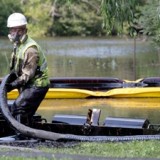One is not supposed to anticipate lawbreaking, much less say that one will participate. Interesting that as I write this, it is the 71st anniversary of Winston Churchill becoming Prime Minister of Britain. I claim no resemblance to the great man – I only say that I learned from him that candour is the only sensible, and indeed honest, way to deal with problems.
I must tell you, then, that there will be civil disobedience all over the province if the governments proceed with BC’s Fish Farm Policy and its Energy Plan and, with federal blessing, with the pipelines and tankers taking the bitumen from the Tar Sands over BC’s wilderness and down our coast in tankers.
Let me set forth the problems about which I intend to be candid:
- Our wild salmon are in extreme danger and much of that danger comes from salmon farms with the profits going overseas. Closed containment is rejected by the farmers as being too expensive. Think on that. What they’re clearly saying is “in order to run our business we need British Columbians to absorb the cost of going to closed containment!” They say, plainly, that the cost to BC must be your environment and your wild salmon.
- Independent Power Producers (IPPs) are ruining our rivers with their dams, roads and transmission lines.
- BC Hydro, on direct orders from the Liberal government must make sweetheart deals with these IPPs by which they must pay them more than double what Hydro (through their export arm Powerex) can sell it for – or use it themselves instead at 9-12 times what BC Hydro can make the power for themselves.
- IPP power is produced during the run-off when BC Hydro doesn’t need the power and thus must accept this private power at a huge loss.
- Because of the foregoing BC Hydro must pay IPPs, over the next 20-40 years over $50 Billion – rising with each contract – for power they don’t need. (When the Clark government says we need IPP power to make BC self sufficient they are lying through their teeth).
- Virtually none of the IPP profits stay in BC and the jobs, after construction – mostly from outside the communities where the projects are built – are custodial only.
- Both the federal and BC governments support Enbridge building two 1000+ km pipelines from the Tar Sands to Kitimat, one for bringing the bitumen (i.e. Tar Sands gunk) to Kitimat, the second to take the natural gas derivative that is mixed with the bitumen so it is sufficiently liquefied to pass through the pipeline, back to Alberta. Because there is no timeline involved, a burst pipe is not a risk but a certainty.
- Kinder-Morgan, who owns the existing bitumen pipeline from the Tar Sands to the the Burrard Inlet near Vancouver, wants to more than double its capacity – meaning a dramatic increase in supertankers carrying bitumen right by Vancouver, the Gulf Islands, and Victoria.
- When (not if) a pipeline bursts there is nothing Enbridge or Kinder-Morgan can do except shut off the supply with all the gunk already in the pipeline going onto the lands and creeks it passes. One can readily see that every second after a rupture, the spill will be aggravated. Enbridge’s record in these matters is appalling – their dumping of bitumen last summer into the Kalamazoo River in Michigan being but one example.
- These pipelines pass through some of the last wilderness left in the world and there is no way tEnbridge can patrol over 1000 km of pipe in this wilderness and even if they did, nothing can be done about the bitumen in the pipes for days or longer if there’s a rupture.
- The Federal and Provincial governments have already agreed to approve huge tankers taking the bitumen down the BC coast – probably the most dangerous coast in the world and, again, it’s not a risk of loss and catastrophic consequences but a certainty we’re dealing with. Prime Minister Harper compares this coastline with the Atlantic coast or the Great Lakes!
- Finally, I feel compelled to mention that I learned recently the BC Liberal government is quietly designing a wolf “management” (read “slaughter”) plan that will likely sanction, among other horrors, the killing of wolves from helicopters under the pretense of protecting caribou populations. I dealt with this crap when I was Environment Minister in 1979, instituting a ban on the slaughter of wolves; clearly the forces in favour of this arcane practice never let up.
Here is the kicker: The public has virtually no say as to whether or not these projects will proceed.
The only public input permitted is the right to go to the environmental assessment process which comes after the decision to go ahead has been made, and then only to make suggestions about environmental rules to be followed.
Here’s what I said earlier: “I must tell you, then, that there will be civil disobedience all over the province if the governments proceed with BC’s Fish Farm Policy and its Energy Plan and, with federal blessing, with the pipelines and tankers taking the bitumen from the Tar Sands over BC’s wilderness and down our coast in tankers.”
Now let me pose this question: Is there any way these projects can be stopped without people picketing and going to jail?
And whose fault will that be – The Cassandra who predicts what will happen or the governments which not only permit but actively support the environmental crimes, and bankruptcy of BC Hydro, brought on knowingly and heedlessly by these governments?










